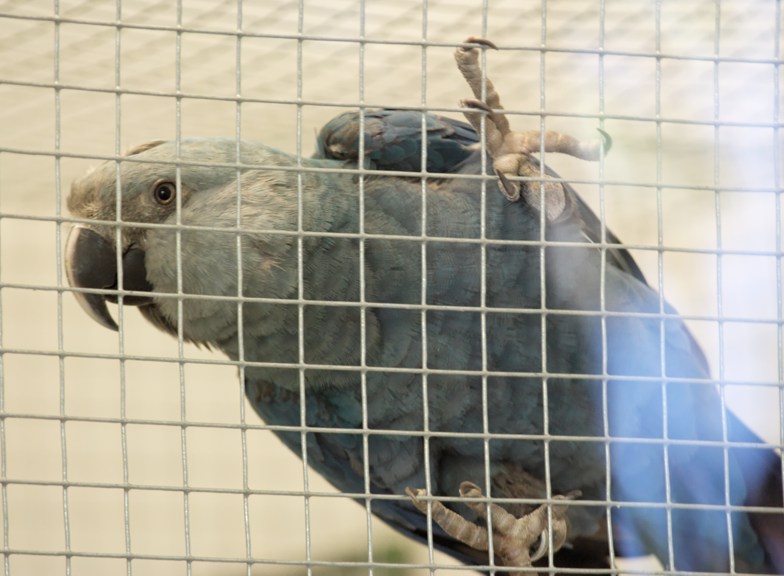For the last two weeks or so, I've been reading The Lizard King. Long story short, it's a book on the dark side of the exotic pet industry - smuggling. Virtually every animal in Petco was, at some point in its history, taken from the wild and smuggled into captivity. A lot of common pets actually come from Australia, a place known for strict wildlife laws. Thank smugglers for every cockatiel, budgerigar, and bearded dragon outside of Oz.
Most people would, off the top of their heads, say that taking animals from their wild habitats is a bad thing. Businesspeople and zoos aren't stupid; they know that, to have a future in their business, they have to sustain populations of these animals. For all the ill smuggling brings, there is a silver lining to the cloud: Sometimes, a captive-bred population is all an animal has.

Enter the Spix's Macaw (Cyanopsitta spixii). Native to only to the Bahia state of Brazil, this bird was cited in The Lizard King as being extinct in the wild, but having three members in one man's captive collection. It is small as macaws go, being up to 2 feet in length. It is so endangered that we are not sure whether or not it has any wild relatives.
In this case, the Spix's Macaw was hit two-fold. Not only was the Amazon rainforest already under threat (do you like hamburgers? You just killed a parrot if you said yes), but the Spix nested in only one type of tree: the Caribbean Trumpet Tree (Tabebuia aurea). These trees were unsustainable for timber. The Africanized bee and exotic pet collection did not help, either. Ironic that captive breeding is the only thing keeping this species alive.

Currently, the only known Spix's Macaws are in captivity. Various zoos have been able to breed them largely thanks to animal smugglers. It is becoming more and more the situation that zoos are evolving into "living museums." We're living unsustainably, and, knowing how humans work, we will continue to do so. There are somewhere around 85 of these birds in captivity. Until its natural habitat can be restored, the Spix's Macaw must join the Scimitar-Horned Oryx on the list of "extinct in the wild."
Aside from The Lizard King, the only other media outlet that has really covered these birds is the movie Rio. Although the movie says Rio and his mate are "blue macaws," their rarity and scientific name point to Spix's. Subtle reference is subtle, but still there.
Most people would, off the top of their heads, say that taking animals from their wild habitats is a bad thing. Businesspeople and zoos aren't stupid; they know that, to have a future in their business, they have to sustain populations of these animals. For all the ill smuggling brings, there is a silver lining to the cloud: Sometimes, a captive-bred population is all an animal has.

Enter the Spix's Macaw (Cyanopsitta spixii). Native to only to the Bahia state of Brazil, this bird was cited in The Lizard King as being extinct in the wild, but having three members in one man's captive collection. It is small as macaws go, being up to 2 feet in length. It is so endangered that we are not sure whether or not it has any wild relatives.
In this case, the Spix's Macaw was hit two-fold. Not only was the Amazon rainforest already under threat (do you like hamburgers? You just killed a parrot if you said yes), but the Spix nested in only one type of tree: the Caribbean Trumpet Tree (Tabebuia aurea). These trees were unsustainable for timber. The Africanized bee and exotic pet collection did not help, either. Ironic that captive breeding is the only thing keeping this species alive.

Currently, the only known Spix's Macaws are in captivity. Various zoos have been able to breed them largely thanks to animal smugglers. It is becoming more and more the situation that zoos are evolving into "living museums." We're living unsustainably, and, knowing how humans work, we will continue to do so. There are somewhere around 85 of these birds in captivity. Until its natural habitat can be restored, the Spix's Macaw must join the Scimitar-Horned Oryx on the list of "extinct in the wild."
 |
| From the movie. Yeeep. |
Aside from The Lizard King, the only other media outlet that has really covered these birds is the movie Rio. Although the movie says Rio and his mate are "blue macaws," their rarity and scientific name point to Spix's. Subtle reference is subtle, but still there.



No comments:
Post a Comment